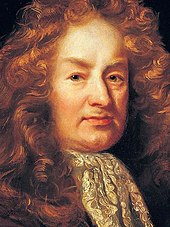Elias Ashmole
Elias Ashmole (born May 23, 1617 in Lichfield , Staffordshire , England , † May 18 or 19, 1692 in South Lambeth near London ) was a scientist , lawyer , alchemist and historian and had connections to Oxford University .
Life
In 1646 he was involved with the astrologer William Lilly , the doctor Thomas Wharton, the mathematician William Oughtred and others in founding the "House of Solomon". This can be traced back to Francis Bacon's idea from his utopian state novel Nova Atlantis . From Ashmole's diaries it is known that he and Colonel Henry Mainwaring from Karincham (Cheshire) became a member of a Masonic lodge in Warrington ( Lancashire ) on October 16, 1646 ; alongside Robert Moray (photo taken on May 20, 1641), he is referred to as one of the first speculative bricklayers.
During the 1650s, Ashmole was intensely involved in alchemy , translating alchemical books from Latin into English, including a book by John Dee's son Arthur Dee. He was assisted in this by William Backhouse , a landowner and alchemist who taught Ashmole and developed a fatherly relationship with him. His Theatrum Chemicum Britannicum , a collection of alchemical poems in English, published in 1652 , is considered his masterpiece and was highly valued in alchemical circles. Ashmole also published under the pseudonym James Hasolle (an anagram of his name) e.g. B. the English translation of Fasciculus Chemicus (1650) by Arthur Dee , and had the alchemist s nickname Mercuriophilus Anglicus.
Around 1682 he donated his extensive collection of historical documents and rarities to the University of Oxford, a large part of which came from the takeover of the Musaeum Tradescantianum built by the royal gardeners John Tradescant the Elder and his son John Tradescant the Younger . This collection formed the basis of the Ashmolean Museum named after Ashmole . Bernard Ashmole was one of his descendants.
Ashmole was an "Original Fellow" of the Royal Society .
literature
- CH Josten (Ed.): Elias Ashmole (1617–1692): his autobiographical and historical notes, his correspondence and other contemporary resources related to his life and work, 5 volumes, Oxford: Clarendon Press 1966
Web links
- Literature by and about Elias Ashmole in the catalog of the German National Library
- masonic biography (English)
- Entry to Ashmole; Elias (1617-1692) in the Archives of the Royal Society , London
Individual evidence
- ^ John Ferguson Bibliotheca Chemica , Volume 1, 1906, p. 52
| personal data | |
|---|---|
| SURNAME | Ashmole, Elias |
| BRIEF DESCRIPTION | English scientist, lawyer, alchemist and historian |
| DATE OF BIRTH | May 23, 1617 |
| PLACE OF BIRTH | Lichfield , Staffordshire , England |
| DATE OF DEATH | May 19, 1692 |
| Place of death | South Lambeth near London |
